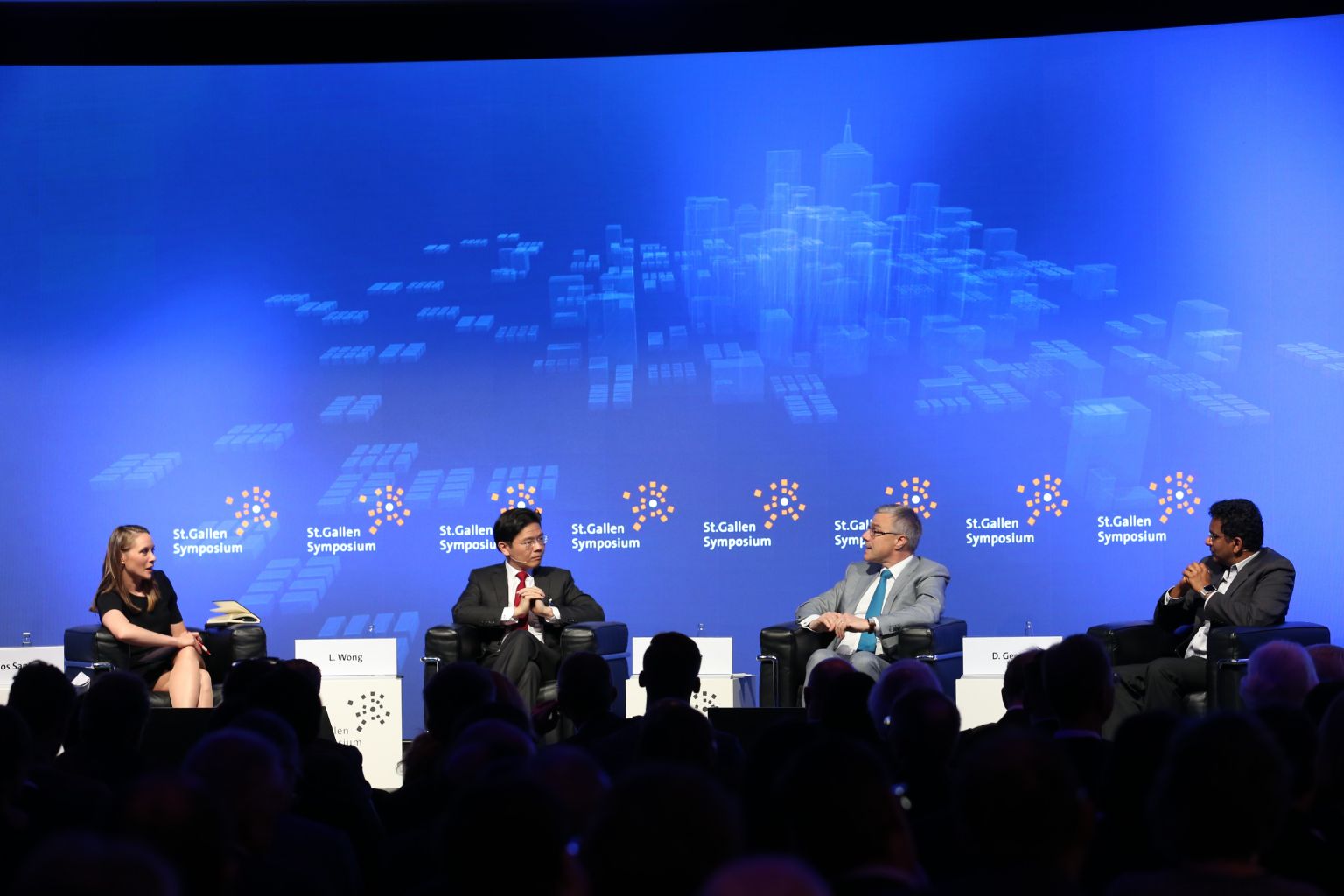Focus on skills, not paper qualifications, to embrace technological change: Lawrence Wong
Sign up now: Get ST's newsletters delivered to your inbox

Minister for National Development and Second Minister for Finance Lawrence Wong (second from left) said credentialism - using paper qualifications as a measure of success - is not a education problem, but a societal one.PHOTO: ST FILE
PHOTO: 48TH ST. GALLEN SYMPOSIUM
Ng Jun Sen
Follow topic:
ST GALLEN, SWITZERLAND - To cope with technological change, Singapore must emphasise skills, performance, and contributions to society, rather than paper qualifications, said Minister for National Development and Second Minister for Finance Lawrence Wong on Friday (May 4).
"The paper qualification does not define who you are as a person. That is a mindset change that we are trying to effect in Singapore," Mr Wong said, in answer to a question from a Japanese audience member at the 48th St Gallen Symposium on whether Singapore's education system gives opportunities to less qualified people.
The plenary session was part of the three-day symposium, established in 1970 by the International Students' Committee from the University of St Gallen in Switzerland, and which holds yearly talks involving policymakers, business leaders and academics.
This year's theme was the future of work in light of advances in robotics, automation and artificial intelligence.
Speaking on a panel on the readiness of the next generation workforce on the event's final day, Mr Wong said credentialism - using paper qualifications as a measure of success - is not a education problem, but a societal one.
He said this is a problem faced not only in Singapore but in other Asian countries as well, and there is a need to shift away from mere paper qualifications in a time of fast technological change.
Said Mr Wong: "Education is not just about content, but also values. A lot of these values that we talk about, on intellectual curiosity, that desire to learn, grit, resilience, the ability for delayed gratification, all these are important values to instill more so than content, because content can change."
Former GovTech chief executive Jacqueline Poh, who was also a speaker at the symposium, told The Straits Times how her agency's efforts to hire non-degree holders has been challenging because of this mindset.
GovTech, which oversees digital transformation in the public sector, had since 2016 sought out four polytechnic graduates to join its ranks, as they had passed its in-house coding tests and were deemed to be highly skilled.
Despite the offer to sponsor them in expensive overseas specialist courses in cyber security, they turned it down in order to pursue a degree in university, said Ms Poh.
"As it turns out, we actually had more difficulty than we expected. We had a lot of challenges trying to get students and parents to agree... If they have a place in university, why give that spot up?"
In an effort level the playing field between graduates and non-graduates, the public sector has merged some of those separate career tracks into a single stream, Mr Wong said in an interview after his session.
The push to merge them was part of the pledge made by Prime Minister Lee Hsien Loong in 2014 that the Public Service would do more to support the aspirations of non-graduates.
Mr Wong said this does not mean that degrees are irrelevant, but that paper qualifications should not be the single point of focus for employers to determine someone's capability.
"We are talking about the broader basis of assessment that is more accurate, that is not just based on one single piece of information," he said.
In the Finance Ministry, for example, the recruitment process includes an essay, among other things, to help MOF appraise and assess the candidate.
He said the Government cannot simply insist that the public sector declare no degree is needed, and hope that this will cause mindset change.
"Each organisation obviously needs to identify and build up its own measures and human resources systems according to its needs. I think it is important work that is already happening," he told ST, adding that he hopes to see more fruitful outcomes over time.
The plenary session was moderated by CNN anchor Nina dos Santos. The other panelists were Mr Dileep George, co-founder of artificial intelligence developer Vicarious Inc and Swiss staffing company Adecco Group chief executive Alain Dehaze.
Over the three days of the symposium, more than 100 international speakers talked on topics such as the environment, gender equality and social inequality, especially for those who are unable to keep pace with the tech trend.
Correction note: This story has been edited for clarity.

